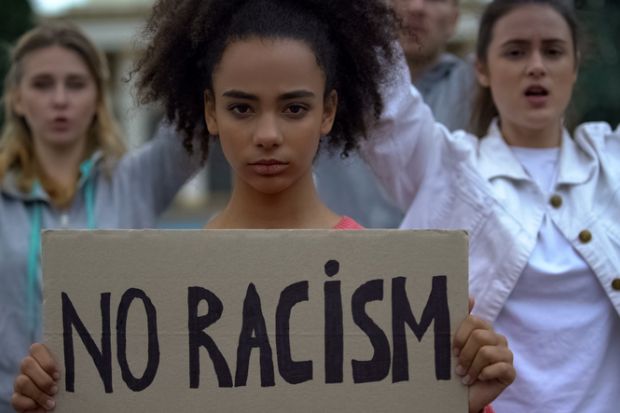The anti-racism protests that have swept the globe following the death of George Floyd have reignited the campaign to remove the statue of Cecil Rhodes from the University of Oxford, as the movement to decolonise the curriculum and stamp out racism in UK universities gains momentum.
Academics and campaigners told Times Higher Education they hoped this was a significant moment in the fight for racial equality in higher education but warned that changes must go deeper than removing symbols that venerate colonialists and slave traders from UK universities − including that of Rhodes, the imperialist remembered for beginning the policy of enforced racial segregation in South Africa.
On 9 June, hundreds of protesters gathered outside Oxford’s Oriel College, where the statue of Rhodes is displayed, following the toppling of a statue of Edward Colston, an 18th century slave trader, which was pulled down in Bristol.
The university continued to resist the calls, with Oxford’s vice-chancellor Louise Richardson recently saying that “hiding your history is not the route to enlightenment”.
However, Sarah Brown, the leader of Oxford City Council, said the council believed that “it would be better for the statue to be placed in a museum, such as the Ashmolean or the Museum of Oxford”.
Nathaniel Adam Tobias Coleman, a member of the Rhodes Must Fall campaign, which began in 2015, said that “a statue on a pedestal is not history, it is veneration; [the campaign] is saying that we don’t want a white supremacist looking down his nose at us as we walk through Oxford…It really is incumbent on the Oriel College, the university and the public more generally to take this opportunity to reflect on the positions they may have held in the past, that they may hold now and to choose to be on the right side of history.”
At the same time, London Metropolitan University has announced that it will remove the name of Sir John Cass from its Art, Architecture and Design School, as it “contributes to the redemption of a man without acknowledging the enormous pain he caused as a major figure in the early development of the slave trade”. Meanwhile, the University of Liverpool said that it would rename a building named after former prime minister William Gladstone due to his links to the slave trade.
Sofia Akel, a race equality in education specialist, previously at Goldsmiths University, said that “universities that take [the symbols] down recognise that these are traumatic figures for many students to see and hear every day. Universities that refuse to do the same are basically saying that they do not care about the lives of their black and brown students.”
“Taking down a statue doesn’t equate to decolonisation, but it is a necessary step,” she said. “To truly decolonise, what you are doing on the outside must be reflected on the inside.”
Kalwant Bhopal, professor of education and social justice at the University of Birmingham, agreed. “We are living in a significant moment…but we have been here before,” she warned.
“It is really important universities consider the symbolic meaning of these statues and their links with slavery and oppression, but what we need is real change as they are pulled down,” she said.
“Institutions must address their deeply embedded structural racism, such as the BAME attainment gap, the lack of BAME academics at senior levels and decolonising the Eurocentric curriculum. While universities now say they are looking at this, they should have been doing it already,” she said.
For Jason Arday, assistant professor in sociology at Durham University, “if [the movement] was sustained it could have a huge impact but where will the allies be in three weeks?”
“What makes change is real action; people need to work cohesively across academic disciplines and come up with real solutions,” he said.
Register to continue
Why register?
- Registration is free and only takes a moment
- Once registered, you can read 3 articles a month
- Sign up for our newsletter
Subscribe
Or subscribe for unlimited access to:
- Unlimited access to news, views, insights & reviews
- Digital editions
- Digital access to THE’s university and college rankings analysis
Already registered or a current subscriber?








